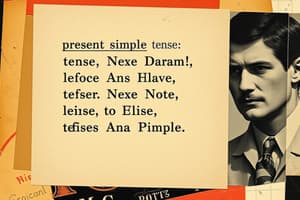Podcast
Questions and Answers
What is the structure of yes/no verb to be questions?
What is the structure of yes/no verb to be questions?
- Modifier followed by verb 'to be' followed by subject (correct)
- Subject followed by modifier followed by verb 'to be'
- Subject followed by verb 'to be' followed by modifier
- Modifier followed by subject followed by verb 'to be'
Which type of questions use interrogative pronouns 'who' and 'where'?
Which type of questions use interrogative pronouns 'who' and 'where'?
- Wh-questions (correct)
- Indirect questions
- Direct questions
- Yes/No verb to be questions
In 'Who went to the party?', what type of question is being asked?
In 'Who went to the party?', what type of question is being asked?
- Direct question
- Interrogative pronoun question (correct)
- Indirect question
- Yes/No verb to be question
Which part of the sentence is inverted in forming a yes/no verb to be question?
Which part of the sentence is inverted in forming a yes/no verb to be question?
'Where did the storm hit?' What does the verb 'hit' describe in this question?
'Where did the storm hit?' What does the verb 'hit' describe in this question?
'Is the cake delicious?' is an example of what type of question?
'Is the cake delicious?' is an example of what type of question?
'What did you eat?' Which type of question is this?
'What did you eat?' Which type of question is this?
'Are the students ready?' indicates a question about:
'Are the students ready?' indicates a question about:
'Who is calling you?' What kind of word is 'who' in this context?
'Who is calling you?' What kind of word is 'who' in this context?
'Is she running late?' Which part of the sentence is the subject?
'Is she running late?' Which part of the sentence is the subject?
Study Notes
Yes/No Verb to Be Questions: A Guide to Interrogative Forms
When it comes to asking questions, "yes/no verb to be" questions are some of the most commonly used. These questions, which follow a specific structure, help us determine whether something is true or false, exists or doesn't exist, or is the case or not.
Interrogative Forms
Yes/no verb to be questions consist of a form of the verb "to be" (e.g., am, is, are, was, or will be) followed by a subject and a modifier. The modifier is then inverted to form the question. Here's an example:
- Original statement: The cake is delicious.
- Yes/no verb to be question: Is the cake delicious?
In this example, the verb "to be" (in its base form "is") is followed by the subject "the cake" and the modifier "delicious." To form the question, the subject and modifier are inverted, and the verb "to be" remains in its base form, resulting in "Is the cake delicious?"
Questions with "Who" and "Where"
These interrogative pronouns function a bit differently from yes/no verb to be questions. Questions with "who" and "where" typically use a verb that describes an action, state, or location. Here are some examples:
- Who went to the party? (The verb "went" describes an action.)
- Where did the storm hit? (The verb "hit" describes a location.)
Singular and Plural Counts
Yes/no verb to be questions can be used for both singular and plural subjects. The structure remains consistent, with the verb "to be" in its base form followed by the subject and modifier inverted to form the question.
For example:
- Original statement: The students like pizza.
- Yes/no verb to be question: Do the students like pizza? (singular count)
- Original statement: The dogs are playing in the park.
- Yes/no verb to be question: Are the dogs playing in the park? (plural count)
In conclusion, yes/no verb to be questions, as well as questions with "who" and "where," are valuable tools in our communication arsenal. Understanding their structure and usage will help us ask clear and concise questions that will lead to more precise and timely responses.
Studying That Suits You
Use AI to generate personalized quizzes and flashcards to suit your learning preferences.
Description
Learn about forming yes/no verb to be questions using the verb 'to be' with examples and understand how they differ from questions with 'who' and 'where'. Explore how these interrogative forms can be applied to both singular and plural subjects for effective communication.




